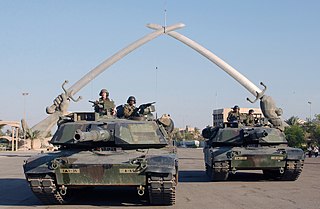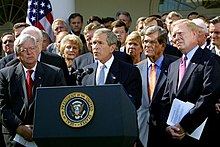
The Iraq disarmament crisis was claimed as one of primary issues that led to the multinational invasion of Iraq on 20 March 2003.

United Nations Security Council Resolution 1441 is a United Nations Security Council resolution adopted unanimously by the United Nations Security Council on 8 November 2002, offering Iraq under Saddam Hussein "a final opportunity to comply with its disarmament obligations" that had been set out in several previous resolutions. It provided a justification for the subsequent US invasion of Iraq.

In March 2003 the United States government announced that "diplomacy has failed" and that it would proceed with a "coalition of the willing" to rid Iraq under Saddam Hussein of weapons of mass destruction the US and UK claimed it possessed. The 2003 invasion of Iraq began a few days later. Prior to this decision, there had been much diplomacy and debate amongst the members of the United Nations Security Council over how to deal with the situation. This article examines the positions of these states as they changed during 2002–2003.

The War Powers Resolution is a federal law intended to check the U.S. president's power to commit the United States to an armed conflict without the consent of the U.S. Congress. The resolution was adopted in the form of a United States congressional joint resolution. It provides that the president can send the U.S. Armed Forces into action abroad only by declaration of war by Congress, "statutory authorization", or in case of "a national emergency created by attack upon the United States, its territories or possessions, or its armed forces".
The United States is a charter member of the United Nations and one of five permanent members of the UN Security Council.

Carl Milton Levin was an American attorney and politician who served as a United States senator from Michigan from 1979 to 2015. A member of the Democratic Party, he was the chair of the Senate Armed Services Committee from 2001 to 2003 and again from 2007 to 2015.

A declaration of war is a formal declaration issued by a national government indicating that a state of war exists between that nation and another. A document by the Federation of American Scientists gives an extensive listing and summary of statutes which are automatically engaged upon the United States declaring war.

United Nations Security Council Resolution 678, adopted on 29 November 1990, after reaffirming resolutions 660, 661, 662, 664, 665, 666, 667, 669, 670, 674 and 677, the council noted that despite all the United Nations efforts, Iraq continued to defy the Security Council.

The American Service-Members' Protection Act, known informally as the Hague Invasion Act, is a United States federal law described as "a bill to protect United States military personnel and other elected and appointed officials of the United States government against criminal prosecution by an international criminal court to which the United States is not party." The text of the Act has been codified as subchapter II of chapter 81 of title 22, United States Code.

The Senate Report on Iraqi WMD Intelligence was the report by the United States Senate Select Committee on Intelligence concerning the U.S. intelligence community's assessments of Iraq during the time leading up to the 2003 invasion of Iraq. The report, which was released on July 9, 2004, identified numerous failures in the intelligence-gathering and -analysis process. The report found that these failures led to the creation of inaccurate materials that misled both government policy makers and the American public.
Events in the year 2002 in Iraq.
The use of force by states is controlled by both customary international law and by treaty law. The UN Charter reads in article 2(4):
All members shall refrain in their international relations from the threat or use of force against the territorial integrity or political independence of any state, or in any other manner inconsistent with the purposes of the United Nations.

A dispute exists over the legitimacy of the 2003 invasion of Iraq. The debate centers around the question whether the invasion was an unprovoked assault on an independent country that may have breached international law, or if the United Nations Security Council authorized the invasion. Those arguing for its legitimacy often point to Congressional Joint Resolution 114 and UN Security Council resolutions, such as Resolution 1441 and Resolution 678. Those arguing against its legitimacy also cite some of the same sources, stating they do not actually permit war but instead lay out conditions that must be met before war can be declared. Furthermore, the Security Council may only authorise the use of force against an "aggressor" in the interests of preserving peace, whereas the 2003 invasion of Iraq was not provoked by any aggressive military action.
The Kerry and Feingold Amendment proposed the withdrawal of American armed forces from Iraq by July 2007 with the exception of a few to maintain security. The proposal was defeated in the United States Senate in an 86 to 13 vote.
British parliamentary approval for the invasion of Iraq was given by the elected members of the House of Commons to Tony Blair's government on the eve of the 2003 invasion of Iraq, in a series of two votes, on 18 March 2003.

The Authorization for Use of Military Force (AUMF) is a joint resolution of the United States Congress which became law on September 18, 2001, authorizing the use of the United States Armed Forces against those responsible for the September 11 attacks. The authorization granted the President the authority to use all "necessary and appropriate force" against those whom he determined "planned, authorized, committed or aided" the September 11 attacks, or who harbored said persons or groups. The AUMF was passed by the 107th Congress on September 18, 2001, and signed into law by President George W. Bush on September 18, 2001. Since its passage in 2001, U.S. Presidents have interpreted their authority under the AUMF to extend beyond al Qaeda and the Taliban in Afghanistan to apply to numerous other groups as well as other geographic locales, due to the act's omission of any specific area of operations. In December 2016, the Office of the President published a brief interpreting the AUMF as providing Congressional authorization for the use of force against al-Qaeda and other militant groups. Today, the full list of actors the U.S. military is fighting or believes itself authorized to fight under the 2001 AUMF is classified.

Political leaders of the US and UK who led the arguments which resulted in the invasion of Iraq have claimed that the war was legal. However, legal experts, including the chairman of the Iraq Inquiry, John Chilcot, who led an investigation with hearings from 24 November 2009 to 2 February 2011, concluded that the process of identifying the legal basis for the invasion of Iraq was unsatisfactory and that the actions of the US and the UK have undermined the authority of the United Nations.

The Authorization for Use of Military Force Against Iraq Resolution or Joint Resolution to authorize the use of United States Armed Forces pursuant to United Nations Security Council Resolution 678, was the United States Congress's January 14, 1991, authorization of the use of U.S. military force in the Gulf War.
The National Defense Authorization Act (NDAA) for Fiscal Year 2013 is a United States federal law which specifies the budget and expenditures of the United States Department of Defense for fiscal year 2013. The full title is An Act to Authorize Appropriations for fiscal year 2013 for military activities of the Department of Defense, for military construction, and for defense activities of the Department of Energy, to prescribe military personnel strengths for such fiscal year, and for other purposes. This law has been assigned the number PL 112–239.

H.R.932 (118th), also known as To repeal the authorizations for use of military force against Iraq, is a bill in the 118th United States Congress that would have repealed the 2002 AUMF. H.R.932 was sponsored on February 9, 2023 by Barbara Lee, the lone vote against the 2001 AUMF. H.R.932 was co-sponsored by 70 Representatives including 27 Republicans. S.316 (118th), also known as A bill to repeal the authorizations for use of military force against Iraq, is the Senate version of H.R.932 that would have repealed the 2002 AUMF. S.316 was sponsored on February 9, 2023 by Virginia Senator Tim Kaine and Indiana Senator Todd Young. S.316 was co-sponsored by 46 Senators including 12 Republicans. S.316 advanced from the Senate by 66 votes to 30 on March 29, 2023. 18 Republican Senators voted in favor of Kaine's proposal while no Democratic Senators voted against it.












